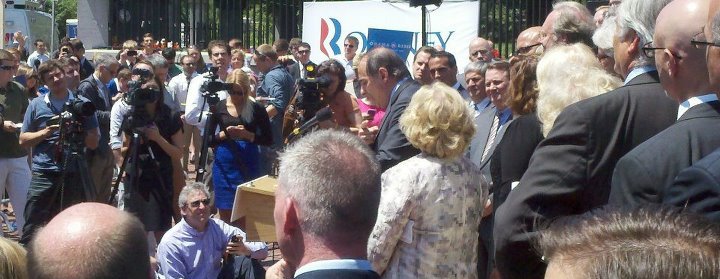Lots of digital ink has been spilled today about Mitt Romney’s new stab at authenticity, in the afterglow of his speech last night at Mississippi State University. Denizens of Romneyland are lamenting that, last time around, voters never really got to know the real Mitt, and rejoicing the appearance of the genuine article.
That’s nothing new: the same refrain has played after every one of his campaigns — including his 1994 run for US Senate, in which Ted Kennedy portrayed him as a cruel-hearted job-killing plutocrat. Even his one successful campaign, for governor in 2002, was later re-invented as a misunderstanding: a conservative mistaken for a moderate.
Repudiating the previous Romney is always part of the media strategy for re-branding the product for new times and circumstances. Sometimes, the new Romney marketing rings true to those who know him, for a while. That only lasts until the marketing strategy shifts again.
My favorite example came in early 2011, with the campaign-oriented release of the paperback version of No Apology. When the hardcover came out the previous year, Romneyites were thrilled at what they thought was a shift back to the Mitt they know. But, that was before the Tea Party movement shook up the GOP, routing establishment candidates in 2010 primaries, and signalling that the successful Republican Presidential nominee would need to embrace the hard populist right, which Romney had distanced himself from a year earlier. As I wrote at the time:
Romney certainly appears to be targeting those voters in the paperback’s new introduction, in which he bemoans the “elite” liberals’ destruction of everything the Founding Fathers stood for — especially “freedom,” a word that appears 25 times in the introduction. “Constitution” shows up 11 times. The Tea Party gets mentioned by name, as does the Glenn Beck–promoted 9/12 movement — even Joe the Plumber gets a shout-out.
The friends of Mitt who had been seeing the real Romney a year earlier could only shake their heads and shrug their shoulders when I asked about this new language coming from him.
It’s worth noting, as Romney rolls out more of his anti-poverty platform, that the original No Apology, supposedly a great insight into his true priorities, has almost nothing to say about the problem. The book includes exactly one paragraph noting that, despite the poverty-busting effects of free-market capitalism, “our record is not perfect.” He notes that “Far too many American families live below the poverty line,” especially racial minorities. He even observes “a growing gap between the highest-earning households and the lowest” — which he partly attributes to college education.
In another section of the book, he goes on at length about the cultural harm done by out-of-wedlock births. In that section he seems to imply a link with poverty, though he doesn’t make it explicit and clearly doesn’t quite believe it. Elsewhere (in rejecting the link between economic circumstances and need for higher school spending) Romney argues that “child poverty has actually declined and child health has improved” in recent decades — the same time frame over which out-of-wedlock births surged, to his dismay.
In any event, poverty is addressed nowhere in Romney’s 64 action steps for America, listed at the end of the book. Nor is poverty mentioned anywhere in his “Index of Leading Leading Indicators,” which he puts forward for identifying the country’s strength and progress.
Poverty, simply put, has never been a high priority of Romney’s until now. Does that make his sudden interest in it inauthentic? No more than anything else candidates prioritize on the campaign trail. But it’s at least a little telling that its absence from his rhetoric in 2010 didn’t strike anyone as inauthentic.
